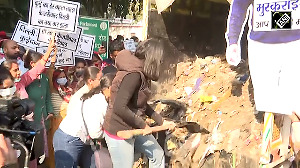There was much fanfare earlier this month about the homecoming of the Indian Diaspora, the Bharatiya Pravasi Divas, of Indians who have made good overseas.
The festival now promises to become an annual government-sponsored event. But homecoming has gone on for years, a regular flurry of winter arrivals, of not just Indians but India-addicts.
What has changed over time, however, is the profile of India-wallahs -- their fluctuating needs, demands and dilemmas. Here is a random sample of some real-life stories I have recently encountered.
The Upwardly Mobile Professional: Born and educated in India, he's thirty-something, and after a varied early career went to America in search of an MBA.
Taking a $60,000 loan he has performed brilliantly at an Ivy League college but now has to repay. Even with a strengthening rupee there is no way he can ever do so on an Indian salary.
Luckily, he's been head-hunted by Wall Street's top investment banks but on cruel terms -- an 18-hour day and a contract that can be terminated "at will".
This means being fired on the spot, by voice-mail for instance. But if he slogs it out, three annual bonuses could erase his debt. There goes his dream of a nice south Delhi flat and a pretty working wife. His heart isn't in it and he swears he'll be back soon. But he knows it's easier said than done.
The European Shopaholic: Fortified with pieces of blue plastic from Barclays, the NRI couple have done the sights -- Rajasthan, Goa and plenty of dropping in on friends and relatives. But the wife is beginning to show signs of panic. She hasn't shopped enough. Their holiday ends in a week and she has a couple of thousand pounds to run through.
While her husband downs Bloody Marys at the nearest bar, she embarks on the rape and pillage of Delhi in right earnest. Last heard of the couple were trying to book a sea container to Britain.
It was the cheapest way of furnishing a suburban house in London, plus ship enough birthday and wedding presents for years to come. Their mission to India has well and truly been accomplished.
The Gap Year Student: Born of an Indian father and Canadian mother, this 19-year-old art student is a conservative beauty and fits the PIO (People of Indian Origin) bill nicely.
Encouraged by her parents she has decided to spend her gap university year in India. She has hit all the right spots -- high and low. Gone trekking in Nepal, night-clubbing in Mumbai and learned hatha yoga in an ashram in Mysore.
The year has sped faster than she imagined and her life has taken a surprising twist. Spotted by a talent scout at a lounge bar launch in Mumbai she has landed a lucrative modelling contract. Offers have followed thick and fast.
She has moved in with an ad executive and forgotten all about her art history degree. Her parents are having hysterics in Toronto. They want their well-brought up daughter back. Small chance -- she's working on her Hindi diction and has her eyes firmly fastened on Bollywood.
The Retired Civil Servant: European by birth but Asian by temperament, this 60-year-old has been spoilt and seduced by India. Twice married and divorced, he has decided to retire here -- female company is civilised, domestic staff is cheap and the country, unlike other parts of Asia, has space and cultural variety.
Now comes the hard part -- for nearly two years he's been trying to buy an 18th century mansion in north Goa. He has hired a local architect to help him restore the house and found a good lawyer to conveyance the deal.
He has even set up an export business to get round cumbersome regulations about foreigners buying property.
But there's a snag -- a family feud is blocking the sale. A branch of the family has set up unauthorised structures in the garden and hired ruffians to protect it.
For two years the man has been battling it out in police stations, courts and with arbitrators.
He also finds his permissions to start a company are held up. So he has decided to look further down the coast and landed a better property at a better price in Sri Lanka. When he looks back on his two years of failed effort in India, he says, it still gives him a headache.






 © 2025
© 2025